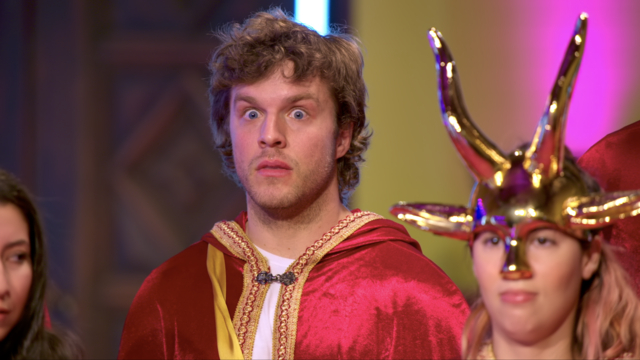The Joe Schmo Show is nothing new. The version set to premiere Jan. 21 on TBS is, in fact, the second revival of a series that aired two seasons on Spike TV (now Paramount Network) beginning in 2003, before returning for a third in 2013. The apparently evergreen premise: In this fake reality competition, everyone is an actor and every outcome is preordained—with the exception of one poor civilian for whom the charade becomes his own personal Truman Show.
[time-brightcove not-tgx=”true”]
To anyone unfamiliar with the original Joe Schmo, the TBS reboot might sound like a ripoff of Jury Duty, the reality comedy that became a surprise sensation on Amazon’s now-defunct FAST platform Freevee in 2023. While the format does predate the latter series, it seems extremely likely that Jury Duty’s popularity played a role in Joe Schmo’s resurrection. And beyond their similar setups, the two series share an unstated yet unmistakable agenda: to exalt their good-sport protagonists—archetypal “regular guys” one and all—at a moment when little consensus exists among the American viewing (and voting) public as to what makes a hero.
For Jury Duty, that man was Ronald Gladden, a then-29-year-old solar contractor selected from a pool of 2500 applicants who’d been told they were volunteering for a documentary on the legal system. Throughout an absurd process in which he served as jury foreperson in a faux civil trial, surrounded by improv pros portraying offbeat jurors and other courtroom personnel, Gladden proved his decency time and time again. Just after he delivered the verdict, the actor he knew as Judge Alan Rosen (Alan Barinholtz) revealed the show’s deception. But instead of laughing in Gladden’s face, Barinholtz praised him for earnestly committing to the responsibility of leading deliberations and being kind to the weirdos with whom he was sequestered. “You, Ronald Gladden, are a hero,” he announced. Laid-back as ever, Gladden took the news in stride. (The surprise $100,000 reward the show’s producers bestowed upon him probably helped.)
In many ways, Gladden fits the Joe Schmo mold. A sham reality show of the Big Brother variety—contestants lived in a house and competed in zany challenges—the original 2003 season centered around Matt Kennedy Gould, a 28-year-old pizza-delivery guy. (It also featured a pre-SNL Kristen Wiig as one of his ostensible rivals.) His casting reflected Spike’s target demographic of young men, an audience that likely appreciated Matt’s positive appraisals of his female castmates’ bodies and an early challenge that had participants parading around in each other’s underwear, as well as a certain aughts-era bro archetype. But Matt came off as a good dude when it counted, vowing to a gay character (played, cringily, by a straight actor) that he was an “ally.” In the finale, host Ralph Garman marveled: “You always made the right choice.”
Subsequent seasons mostly followed suit. (Season 2, a mock dating show, gave its male schmo female counterparts.) While Ben Frisone, the hero of TBS’s Joe Schmo 3.0, certainly belongs in the same lineage as Joes past, the reboot takes pains to position him as another Gladden. A handsome yet approachable 28-year-old electrician, Frisone is introduced in the premiere as “the most normal, good-hearted, down-to-Earth guy we could find.” He says things like: “I root for the underdog. I don’t like it when people bully or demean others for being different.” And his behavior bears that out. In between staged scenes of a more contemporary (if also transparently janky) reality competition called The GOAT, whose corny rituals somewhat resemble The Traitors, his co-stars gush in interviews that Frisone is “a genuinely good person” and “so emotionally intelligent.” One thing he hopes to do with the prize money? Get a kitten.
The new Joe Schmo, much like the old Joe Schmo, is a pretty mediocre show. Whereas Jury Duty benefited from adhering to a mostly traditional sitcom format and keeping its episodes under 30 minutes, Joe Schmo feels long at a 42-minute cable hour; watching a fake hacky reality competition can be even less entertaining than watching a real version of same, because the outcome of each challenge and elimination is preordained. (It’s worth noting that the entire concept of The Joe Schmo Show feels a bit outdated 25 years after the reality TV boom, now that the average viewer is much savvier about how much the typical reality show is manipulated by producers.) It also quickly gets boring to observe the same guy repeatedly making generous, if low-stakes, choices, in a mashup of Candid Camera and random acts of kindness.
This sort of magnanimity porn must be doing something for many viewers, though, given Jury Duty’s breakout success—and specifically that of Gladden. The same year the series premiered, its hero (billed as an “all-around good guy”) hugged Ryan Reynolds in a Mint Mobile commercial and signed an overall deal with Amazon MGM Studios to “produce, develop, and star in content across platforms.” In case there was any doubt that kindness would ultimately become not just his M.O. but also his brand, Gladden’s Instagram bio proclaims, alongside an email address for “business inquiries,” that he “debunked the myth that nice guys finish last.”
Myth or fact, it’s an assumption many would presumably enjoy seeing challenged now that our screens are dominated by reality-TV narcissists, serial killers real and fictional, true-crime scammers, and, of course, a two-time President who’s been both convicted of felonies and held liable for sexual abuse. Yet identifying an everyday hero widely palatable enough to galvanize a broad audience, in times so fragmented that characters like the above reliably split public opinion, isn’t easy. Gladden and subsequently Frisone really do come across as thoughtful, caring, kindhearted people. But who they are—their shared identity markers—seems just as important as how they behave in ensuring they’re universally likable. It can’t be an accident (or, as with Joe Schmo on Spike, a demographic necessity) that both are young, telegenic, apparently straight, white men. Each is open-minded and empathetic, though neither is sanctimonious about those qualities. You can tell they’d be fun to have a beer with, and gentlemanly on a date. Eager as fans might be to project their own beliefs onto Gladden and Frisone, it’s easy to imagine either guy voting for either of last year’s presidential candidates.
Would Jury Duty have become such a hit, and Gladden such a hero, had its producers picked a woman or a person of color or a member of the LGBTQ community (let alone a vocal political partisan) as a star? It seems doubtful, not least because of how poorly reality-hoax shows have historically treated subjects who represent those groups. Deceptive dating shows like Joe Millionaire and I Wanna Marry “Harry” have set up single women as dupes and golddiggers. The twist in Bravo’s gay Bachelor, Boy Meets Boy, which aired the same year Joe Schmo debuted, was that half the men whom the boyfriend-hunting star had been romancing were secretly heterosexual. If a straight guy had won the lead’s heart, he would’ve earned a cash prize.
Contrary to the mean-spirited tones of these shows, which presumed viewers would revel in the humiliation of their queer or female marks, Jury Duty and (especially in its new incarnation) Joe Schmo exist to glorify extraordinarily moral men who are framed as regular guys. Men can flatter themselves by relating to them. People attracted to men can fantasize about dating them. They belong in the same category of delicately constructed paeans to masculinity as Ted Lasso and 2024’s wave of gentle men across pop culture—products of a post-DEI society whose universally relatable default citizen is still straight, white, and male, but whose slight concession to the rest of us is to make that guy a sweetheart. These series function, then, as a subtle yet potent, possibly unintentional form of propaganda, whose function is to convince viewers of all kinds that our current form of patriarchy isn’t necessarily a bad thing. We need only to get as good as the producers of Joe Schmo and Jury Duty, they imply, at picking out the right patriarch.
Leave a comment








